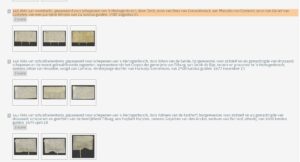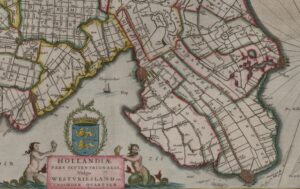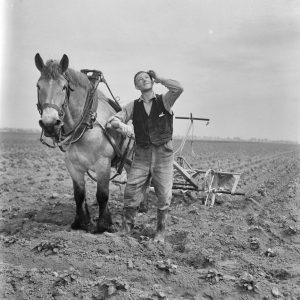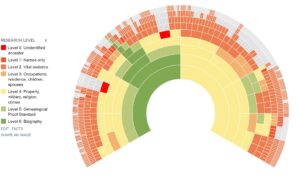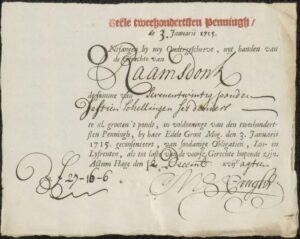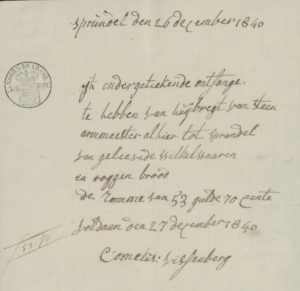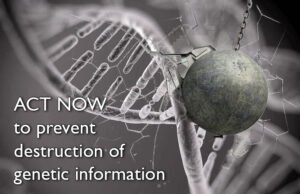Archives have different types of information on their website. The genealogical indexes are often found in a different section than the finding aids with the archival descriptions or catalogs. These descripts are often quite generic and describe whole series, like minutes of court records, incoming correspondence, or tax records. If you are lucky, the archival descriptions in the finding aids will also include names of people. Some archivists have made the effort to add the names of parties to … [Read more...]
About this website
Creating a website like this is a fun activity. There are so many options, so many choices. What do visitors want? What do I want? In this blog I will describe some of the things I encounter in developing and maintaining this website.
Five Ways to Identify Old Places Names in the Netherlands
When you come across a place of origin in a records, you may not be able to find that town on a modern map. Spellings and names changed. Here are five strategies to find out what place is meant. 1: Check contemporary maps You can look at a map from the period, like in the world atlas by Blaeu from 1665. This shows you the names the towns had in the 1600s. Many people did not move that far so I start by looking at a map of the area where the record was created that mentioned the town. I widen … [Read more...]
Quick tip – Read between the lines
I am having fun with an 1827 inventory of the assets belonging to an ancestor. I love reading between the lines to see what the items tell us about my ancestor. Here are some things I noticed. He owned multiple plots of land, had different crops in the field, and had several types of grain stored. Agriculture was likely his main source of income. He owned three cows, one calf, no bulls. Three cows is not enough to live off, so they were probably for their personal use and for the manure … [Read more...]
Level up challenge – 2023 progress report
Two years ago, I issued my level-up challenge. I wanted to take my research to a higher level by gathering more complete information and documentation about my ancestors. See the original blog post for an overview of the levels. In this blog post, I will reflect on my progress in the past year. My goal for 2022 was to get my generation 1-6 ancestors to level 3 or higher. Progress Here's my starting point in 2021: Situation in 2022: Situation now in 2023: Some of these … [Read more...]
Quick tip – No courthouse research in the Netherlands
In the Netherlands, we do not do any of our research in courthouses. If you are an American genealogist, you may be used to visiting the courthouse to get court records. In the Netherlands, such records are transferred to government archives after twenty years. They are typically public after seventy-five years. They are increasingly available online, either as scanned images or via scanning-on-demand. Otherwise, the records can be consulted at the archives in person. Access to court … [Read more...]
Dutch Genealogy News for December 2022
Here is an overview of the new sources, websites, and projects that were announced last month. Sources Scans and indexes of population registers of Bolsward, Hemelumer Oldeferd en Noordwolde, IJlst, Sneek, Stavoren, Wymbritseradeel, Wonseradeel, and Workum in Friesland 1850-1922 have been added to AlleFriezen. This adds over 750,000 names to the database. More than 350 volunteers helped to index the records. See the article about population registers to read more about this source. … [Read more...]
Records that became public in 2023
Happy New Year everybody! Many records become public after 20, 25, 50, 75, or 100 years. Here is an overview of some of the records that became public as of 1 January 2023. Exceptions may exist for records that involve people that could still be alive. Just because records are public does not mean they are immediately available online. Some archives digitize the birth, marriage, and death records immediately, others do not. Some records will be online, some may be ordered via scanning on … [Read more...]
Poor relief records – Not just for poor folks
Several of my ancestors were poor. Some were so poor that they relied on charity. I have found several of them in the records of charitable organizations, such as the deacons of protestant churches, Holy Ghost tables of catholic churches, and civil poor administrations. When I went through the records, I also found ancestors who were not poor; in other capacities. These sources include many names besides the people needing poor relief: Officials, such as the deacons, Holy Ghost Masters, … [Read more...]
Quick tip – Who had the money?
When studying your ancestors, it is helpful to know who the rich people in the community were, even if your ancestors were poor. The rich people in the community may have interacted with your ancestors, and may have created records about them: Rich people may have employed them, for example as laborers, servants, or factory workers. They may have bought their products, for example in the case of shoemakers or weavers. They may have used their services, for example in the case of … [Read more...]
URGENT: Help prevent the destruction of data about biological parents of donor-conceived children
Archives with data about the biological parents of donor-conceived children are being transferred to the National Archives of the Netherlands. These records contain information about the donors who contributed genetic material for conception. A proposed selection list is now open for review until 11 January 2023. The proposal wants to destroy data about donors 110 years after the last treatment. Proposed selection list Please do not hesitate to let the archives know your viewpoint. You … [Read more...]
